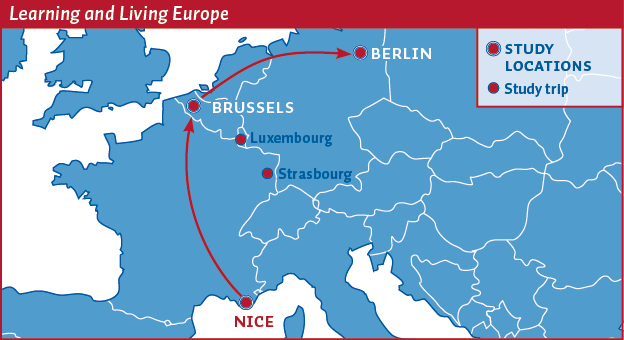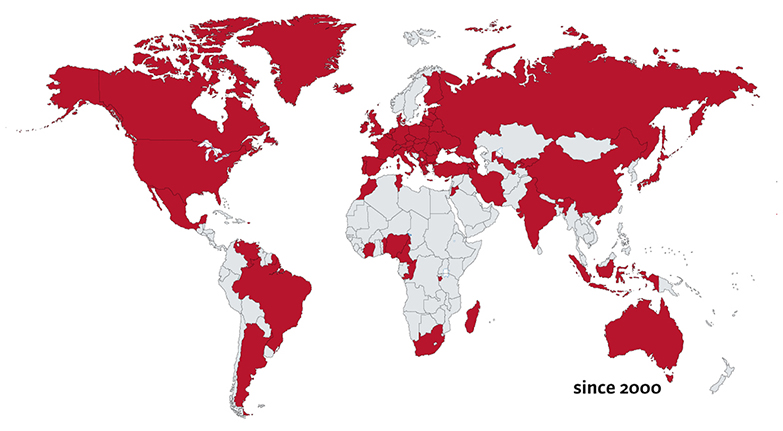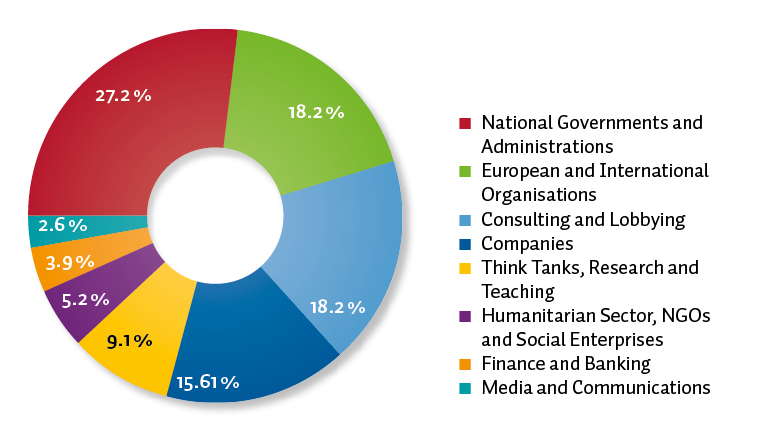|
The Master in Advanced European and International Studies (MAEIS) -
Applied European Policy and Governance Studies
 Duration: 1 year (October to July) Duration: 1 year (October to July)
 Study Locations: Nice (Term 1), Brussels (Term 2), Berlin (Term 3) + Study Trip to the European Institutions in Strasbourg and Luxembourg Study Locations: Nice (Term 1), Brussels (Term 2), Berlin (Term 3) + Study Trip to the European Institutions in Strasbourg and Luxembourg
 Languages: English and French, with a trilingual option in German Languages: English and French, with a trilingual option in German
 Credits: 60 ECTS (or 90 ECTS with internship option) Credits: 60 ECTS (or 90 ECTS with internship option)
 Partner: Universidad Nacional de Educación a Distancia (UNED), Brussels Partner: Universidad Nacional de Educación a Distancia (UNED), Brussels
 Internship Option: 3 to 6 months to be completed by 31 December Internship Option: 3 to 6 months to be completed by 31 December
 Application Deadline: 31 May 2026 Application Deadline: 31 May 2026
 Tuition Fees: €9,800 Tuition Fees: €9,800
 Early Bird (€8,900): 31 January 2026 Early Bird (€8,900): 31 January 2026
Why Choose CIFE?
 Learn from academics and practitioners, including high-ranking national and EU institutional representatives. Learn from academics and practitioners, including high-ranking national and EU institutional representatives.
 Gain insights from peers representing over 30 countries. Gain insights from peers representing over 30 countries.
 Join a worldwide network of over 5,000 CIFE Alumni. Join a worldwide network of over 5,000 CIFE Alumni.
 We're one of the seven "designated institutions" supported by the European Union. We're one of the seven "designated institutions" supported by the European Union.
 95% of our graduates attest full satisfaction with the programme. 95% of our graduates attest full satisfaction with the programme.

Learning and Living Europe
Our Master in Advanced European and International Studies - Applied European Policy and Governance Studies (EUGOV) is designed for highly motivated, multilingual students who seek to analyse political, social and economic dynamics as the next generation of European decision-makers. The programme is taught in two of the working languages of the European institutions (English and French), with a trilingual German option.
Graduates receive two certifications: the Master in Advanced European and International Studies - Applied European Policy and Governance Studies; and the degree qualification "Policy Officer in European and International Organisations" (level 7 EQF), recognised by the French state.
Programme Structure
Our curriculum is regularly updated to reflect the current landscape of European policy and governance.
Please note that the information given below may be subject to change.
Read more about the teaching modules here.
|
|
Study Trip: Visiting the European Institutions
One of the best ways to learn about European and international organisations is to visit them. That is why a study trip to Luxembourg and Strasbourg is an essential part of the programme. During the study trip and the whole term in Brussels, the students meet with public officials who explain the mission of their institution and aspects of their work. These visits enable the students to gain an insight into the working environment of European and international organisations, to make useful contacts and to learn about recruitment procedures.
Among recent visits:
 Brussels: Council of the European Union, European Commission, European External Action Service Brussels: Council of the European Union, European Commission, European External Action Service
 Luxembourg: Court of Justice of the European Union, European Investment Bank Luxembourg: Court of Justice of the European Union, European Investment Bank
 Strasbourg: European Parliament (including a plenary session), Council of Europe, European Court of Human Rights Strasbourg: European Parliament (including a plenary session), Council of Europe, European Court of Human Rights
Trilingual Option
Students who choose the trilingual option will attend additional courses (taught in German) on Germany’s European policy, the federal structure of Germany and the European policy of the German Länder. It will also encompass visits to the Bundestag, Federal Ministries and Representations of a federal state in Berlin. The trilingual option entails an extra written assignment in German on a topic related to Germany’s European policy. Students not taking the trilingual option can also participate in these activities on a voluntary basis.
Who Studies the EUGOV Master?

Where Our Graduates Work

What Our Alumni Are Saying
|
Admission Requirements
We seek motivated candidates who wish to deepen their understanding of the EU.
As an international and interdisciplinary programme, this Master is open to candidates of all nationalities and academic backgrounds.
 Bachelor's degree Bachelor's degree
 An active proficiency in English and French (minimum B2). For the trilingual option: German minimum B1. Levels should be obtained by the start of the academic year. An active proficiency in English and French (minimum B2). For the trilingual option: German minimum B1. Levels should be obtained by the start of the academic year.
 Application Deadline: 31 May 2026 Application Deadline: 31 May 2026
Click for more information on how to apply
Fees and Funding
We strive to make our programme accessible to exceptional candidates through various financial options.
 Tuition Fees: €9,800 Tuition Fees: €9,800
 Early Bird Discount: €8,900 for applications received before 31 January 2026 Early Bird Discount: €8,900 for applications received before 31 January 2026
 Scholarships: Available based on merit and need Scholarships: Available based on merit and need
 Tuition covers academic teaching, accommodation in Berlin, programme-related travel expenses, the study trip to Strasbourg and Luxembourg, and excursions in Brussels. Tuition covers academic teaching, accommodation in Berlin, programme-related travel expenses, the study trip to Strasbourg and Luxembourg, and excursions in Brussels.
Click for more information about fees and funding
|
|
About CIFE
CIFE European Institute has been at the forefront of European education since 1954. We are committed to fostering European integration and cooperation.
Under the presidency of Herman Van Rompuy, former President of the European Council, we continue to innovate in EU studies. Our offices in Nice, Berlin, Brussels and Istanbul ensure an international perspective, preparing you for the complex world of EU affairs.
|
Join the next generation of European decision-makers!
|
|
|